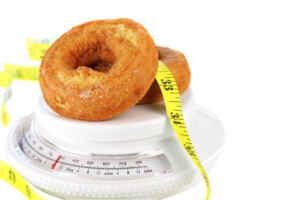 Not all calories are created equal. That’s why instead of counting calories for weight loss, you should track your sugar and carb intake. Let’s explore why this method works better than plain old calorie counting.
Not all calories are created equal. That’s why instead of counting calories for weight loss, you should track your sugar and carb intake. Let’s explore why this method works better than plain old calorie counting.
Why tracking sugar and carbs really works
Tracking sugar and carbs helps keep you accountable and changes your routine because you’ll start to realize there’s more sugar in your favorite foods and drinks than you ever realized.
Sugar is one of the three types of carbohydrates, the other two being starch and fiber. Sugar is a simple, or fast-acting, carbohydrate. According to diabetes.org, it’s the worst type of carb for your body because it delivers “empty calories,” or energy devoid of vitamins, minerals, fiber or other nutrients. In short, it causes you to get full while providing little or no nutritional value. (Sugar typically leaves you hungry within a few hours and often increases cravings for more sugar.)
If you’re worried about heart disease, sugar tracking is far superior to calorie counting. In a 15-year study conducted by Harvard Medical School, Americans who got 25 percent of their daily calorie intake from added sugar were more than two times as likely to die from heart disease as those whose diets consisted of 10 percent added sugar or less.
In addition, Everyday Health states that reducing high glucose levels by moderating your sugar intake helps you avoid depression and chronic disease while also making it easier to control your weight – an important benefit if you’re considering gastric surgery.
What sugars should you avoid?
The first step of tracking sugar intake is being able to recognize what types of sugar you should avoid:
- Added sugars: There’s no question that synthetic sugar is bad for you. Diabetes.org lists several common names for added sugar, including table sugar, cane sugar, sugar cane syrup, beet sugar, raw sugar, brown sugar, molasses, honey, powdered sugar, confectioner’s sugar, maple syrup, turbinado and high-fructose corn syrup. On a packaged food label, anything ending in “-ose” is a sugar, including glucose, dextrose, fructose, lactose and sucrose.
- Natural sugars: Even the natural sugar found in fruit or milk – called fructose and lactose, respectively – can be bad for you if eaten in high enough quantities. According to Jillian Michaels, one of the nation’s leading health and wellness experts, the difference with natural sugars is that they enter your body in conjunction with important nutrients. After all, you can’t get the benefits of an apple, orange or glass of milk without also ingesting that food’s natural sugars.
When grocery shopping, it’s important to keep in mind that there are more than 50 names for sugar found on nutrition labels. The majority of them are nearly impossible to recognize or pronounce. Some of the most commonly used aliases for sugar include beet sugar, corn syrup, dextran, lactose and maltose.
Healthy sugar substitutes
If you have a sweet tooth, your sugar cravings may become overwhelming at times. Denying yourself anything sweet is a recipe for disaster. Satisfy your cravings without spiking your blood sugar using these healthy sugar substitutes suggested by WebMD:
- Stevia, available as SweetLeaf and Truvia
- Whey Low, a unique blend of fructose, sucrose and lactose
- Xylitol, a naturally occurring sugar alcohol found in beets, berries and corn
- Agave nectar, a honey-like substance that comes from a plant (use in moderation because even though it is a natural sugar, it does spike blood sugar levels)
Other tips to reduce sugar intake from Medical News Today include the following:
- Replace sweetened beverages with low-calorie, sugar-free drinks.
- Remember that looking at the sugar line of a food label only gives you one part of the equation (added sugar). It’s best to look at total carbs and subtract the dietary fiber to get what we call “net carbs” – this gives you a more realistic idea of the amount of sugar (in the form of starches) in the product. Cut the sugar content in desserts you bake at home by one-third or more!
- In recipes, replace sugar with cinnamon, ginger, almond extract or vanilla extract, or sugar-free syrup.
Avoid high-sugar foods such as cereal and opt for protein-based options such as plain Greek yogurt with some fresh fruit or sugar-free syrup instead. You should look at sugar and carb tracking as a chance to maintain a healthy body and mind. The benefits over plain old calorie counting are clear, so make now the time to start tracking and reducing your sugar intake!
You might also be interested in: The Best Diets for Weight Loss and Overall Health

